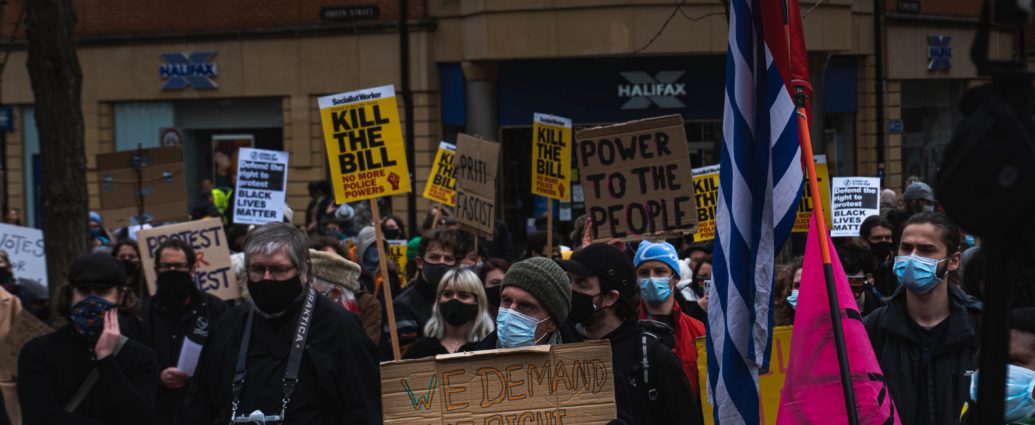Phoebe Schofield
On 5th July, whilst Boris Johnson announced the ending of Covid-19 restrictions in the name of our “personal freedom,” MPs passed a bill that could take away our fundamental right to protest.
The Police, Crime, Sentencing and Courts bill (PCSC) was passed through the house of commons with 365 votes of support. This bill makes protests of even a single person illegal and extends prison sentences to 10 years for ‘serious annoyance’.
This controversial bill means protests and marches, no matter how peaceful, could become a thing of the past. Should this bill succeed in the House of Lords, the UK will take a step back from democracy and an unsettling step towards authoritarianism.
In March, we all witnessed the excessive force imposed upon women attending a peaceful vigil in Clapham Common following the death of Sarah Everard. Photographs show officers removing women in handcuffs, tackling women to the floor and generally displaying unnecessary violence.
“The policing bill signals a worrying step towards authoritarianism.”
Last year, we also saw an overwhelming police presence at the Black Lives Matter protests across the UK. Many protestors attending these marches attested to the disproportionate use of force enacted by police at these events.
If this bill passes in the House of Lords, it will make this kind of police reaction and abuse of power completely permissible.
Under the new law, the police would be allowed to:
- Impose a start and finish time for protests
- Issue £2,500 fines to protestors
- Introduce a 10-year maximum jail term for statue damage
- Allow the home secretary to decide what classifies as ‘serious disruption’
- Stop and search anyone with previous convictions linked to knife crime with no grounds for suspicion
The bill also criminalises trespass, threatening the lifestyle of traveller communities.
Why is this bill so concerning?
The policing bill signals a worrying step towards authoritarianism. Taking away our right to protest robs us of our opportunity to advocate for the needs of marginalised communities. It is simply unacceptable to expect oppressed populations to sit quietly in the face of their oppression.
“For those without power, protesting is one of the only ways to hold institutions accountable.”
Limiting our right to protest increases our powerlessness as it is one of the only ways to pursue social justice and take steps towards equality. Opposition and disagreement are vital to a healthy democracy. Without them, positive changes in society would seldom occur.
Why we need protests
The passing of this bill signals a fundamental derailing of democracy. Protests and peaceful assembly offer the public an opportunity to stand in opposition to the government and dominant culture.
They give marginalised populations and their allies a chance to pressure those in power and voice their own needs and demands. Without protests, the prospective perimeters of change become more and more narrow. For those without power, protesting is one of the only ways to hold institutions accountable.
“Some of the most positive and notable changes in history were promoted by protest.”
This policing bill thereby restricts the public’s engagement in politics by promoting silence and complicity in the face of injustice.
Some of the most positive and notable changes in history were promoted by protest. Women gained the right to vote through disruptive demonstrations and property damage; the abolition of poll tax only happened because of the Miner’s Strike in the 1980s; ACT UP protests revolutionised HIV and AIDS treatment.
More recently, the Black Lives Matter protests across the world have provoked significant changes in law, policy and attitude. For example, funding to police departments in America is being cut, 31 American cities have passed policies restricting the use of chokeholds by Law Enforcement and Breonna’s Law, named after Breonna Taylor, has been passed in Kentucky, banning no-knock search warrants.
“Protests undeniably open up opportunities for dialogue across diverse communities and prompt individuals to reassess their unconscious biases.”
These positive yet overdue changes may not have happened if large groups of people hadn’t mobilized and stood up against unjust social structures. Although there is still a multitude of progress to be made, it is clear that a lot of the time, protests work.
Even in cases where an immediate change is not visible, protests undeniably open up opportunities for dialogue across diverse communities and prompt individuals to reassess their unconscious biases.
Earlier this year, the Conservative Party introduced new measures for strengthening freedom of speech, particularly at universities. This decision makes the PCSC bill appear even more hypocritical.
It seems the Prime Minister wants people to have freedom of speech, but not when it is coming from the mouths of marginalised people, or used to challenge his government.
If you would like to help prevent this bill from being officially passed, sign this petition.
Featured image courtesy of Kyle Bushnell via Unsplash. Image license found here. No changes have been made to this image.

